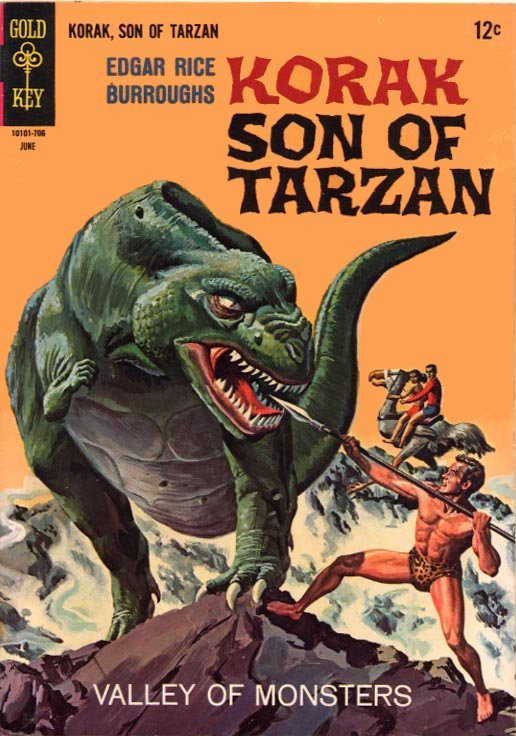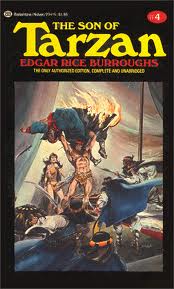 I remember buying the Gold Key Korak comics when I was a kid. I especially loved the dinosaur and lost world painted covers, and even though it stated clearly on the front of each issue “Son of Tarzan” and “Edgar Rice Burroughs,” I somehow never put two and two together until I began reading The Son of Tarzan. Oh, well. Live and learn. And that’s essentially what this book is all about: Tarzan’s son lives in and learns the ways of the jungle in a strikingly similar manner in which his father did. If you’ve read the first three, you’ll probably want to read this one simply because it ties up everything with the Russians.
I remember buying the Gold Key Korak comics when I was a kid. I especially loved the dinosaur and lost world painted covers, and even though it stated clearly on the front of each issue “Son of Tarzan” and “Edgar Rice Burroughs,” I somehow never put two and two together until I began reading The Son of Tarzan. Oh, well. Live and learn. And that’s essentially what this book is all about: Tarzan’s son lives in and learns the ways of the jungle in a strikingly similar manner in which his father did. If you’ve read the first three, you’ll probably want to read this one simply because it ties up everything with the Russians.
If you haven’t read this one yet, you will be hitting some spoilers very soon. You’ve been warned. Here’s one already – Paulvitch, having run into the jungle at the end of Beasts, is rescued. He’s aged drastically, scarred from torture, and completely unrecognizable. And of course, he blames everything on Tarzan. It is he who acts as the motivating force for the book. He will serparate Jack, Tarzan and Jane’s son, from his family, which will lead to his being stranded in the jungles of Africa. The book explores his growing up and learning to survive in the jungle. Oddly, however, the book is just as much as about the struggles of Meriem, Jack’s – soon to be named Korak – love interest.
From the opening of the first chapter, I thought this was going to be more or less about Paulvitch’s revenge against Tarzan via his son. Well, I’ve been wrong before. Paulvitch doesn’t survive the first handful of chapters. He gets things started then – bam – he’s dead. I was surprised but was really ready to have the Russians out of the picture once and for all. So, no complaints there. I was glad to see Akut return – he actually plays a bigger role in this volume than the previous. It is he who gives Jack the name Korak, the Killer, and becomes his mentor. I would have loved to have seen Sheeta, but you can’t always get what you want. Sadly, however, I am left wondering if the sheeta that was killed at the beginning of the story was ours from Beasts. I hope not, but it’s the law of the jungle and all that.
The biggest surprise for me was Meriem’s story. I expected to have the typical Burroughs’ romance plot, but I’d venture a guess to say that she takes up nearly half the book. We not only learn her background, but we see her growing up and suffering at the hands of an evil Arab long before being rescued and falling in love with Korak. And as expected, once Korak finds Meriem, and learns that he loves her, we know the two are doomed to be separated by distance and social circumstances, just as we expect every thing to work out in the end. Which it does – almost too perfectly.
I can honestly say that I was not looking forward to this novel. (There’s one more that I do not look forward to, but we’ll get there when we get there.) I was reading Tarzan, daggonit, and I didn’t want to read a book about his son. I wanted a hero, not someone like “Boy” from the Weismuller films, who only serves as a plot device or side-kick. When it became evident that Burroughs was going to focus on Korak instead of Tarzan, I felt somewhat relieved. I still wanted Tarzan, but I was willing to give him the benefit of the doubt at this point. When Korak grew to manhood, I was even more relieved, and I never felt like I was reading Tarzan of the Apes retold, though the stories are very similar. At first I was frustrated when that story was interrupted with Meriem. When it became evident she was more than the standard love-interest material, I was fairly comfortable with the story. By the time the story ended, she was much more interesting than Jane in all the previous books combined.
One thing I absolutely did not care for this time around was the heavy reliance upon coincidence. Things definitely progressed at the speed of plot convenience here. First there was Paulvitch being taken to the jungle ilse home of Akut, who happens to take the ape to London, where he almost immediately reconnects with Tarzan. There were lots more, especially involving Meriem’s ordeals. As soon as it was shown her being kidnapped as a child, I automatically knew she would be reunited with her family by the end of the book. Making her an actual princess in the end was pushing it a bit for me, though.
 I did like much of the book and was surprised on occasion. Korak was more mistrustful and bloodthirsty than his father had ever been. And there were more Wiesmuller moments – good ones – in this book than the previous. Akut and Korak have many conversations, but I was more excited to see his relationship with Tantor, which lead to some shocking and bloody moments. And then Burroughs pulled one on me. When we meet Bwana and My Darling, I assumed they would be Meriem’s parents. At one point, I even wondered why My Darling would be teaching her English instead of French. Of course, as soon as Bwana started stripping when he went into the jungle to find Korak, I knew he was Tarzan. Like I said, I’ve been wrong before. By that point, however, I realized I was enjoying the novel much more than I had anticipated.
I did like much of the book and was surprised on occasion. Korak was more mistrustful and bloodthirsty than his father had ever been. And there were more Wiesmuller moments – good ones – in this book than the previous. Akut and Korak have many conversations, but I was more excited to see his relationship with Tantor, which lead to some shocking and bloody moments. And then Burroughs pulled one on me. When we meet Bwana and My Darling, I assumed they would be Meriem’s parents. At one point, I even wondered why My Darling would be teaching her English instead of French. Of course, as soon as Bwana started stripping when he went into the jungle to find Korak, I knew he was Tarzan. Like I said, I’ve been wrong before. By that point, however, I realized I was enjoying the novel much more than I had anticipated.
Of the first four books, I’d place The Son of Tarzan above Retun and below Beasts. The first novel was different enough, to me, to be in its own category. Korak proved to be a very likeable protagonist, the action was there, the fantastical elements, too, with talking to the apes and all. The big surprise was Meriem who proved to be as interesting as Korak. I would definitely not mind seeing these two again.
It’s been fast and furious run so far. Hope you stay along for the ride!
 Sunday, May 11, 2014 at 09:05PM
Sunday, May 11, 2014 at 09:05PM 


